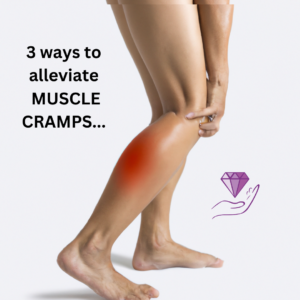3 Muscle Cramp Tips for Fitness Enthusiasts & Runners
Muscle cramps can strike when you least expect them, turning a powerful workout or promising race into a painful experience. These involuntary contractions can sideline even the most seasoned fitness enthusiasts and marathon runners. To keep your muscles functioning optimally, here are three key ways to help prevent and address muscle cramps:
1. Stay Hydrated Before, During, and After Exercise
Staying adequately hydrated is essential for muscle health, especially during long workouts or runs. Dehydration can be a major contributor to muscle cramps as it affects the balance of minerals in the body. 
Here’s how you can maintain hydration:
- Pre-Workout: Begin hydrating several hours before exercising. The aim is to start your activity well-hydrated without feeling waterlogged.
- During Exercise: Drink regularly during your workout. If you are engaging in prolonged exercise exceeding an hour, consider sports drinks that contain electrolytes to replenish what’s lost in sweat.
- Post-Workout: Rehydrate with water or an electrolyte solution after your exercise session to restore any fluid deficits.
2. Balance Your Electrolytes
- Electrolytes like sodium, potassium, magnesium, and calcium play a critical role in muscle function and hydration. An imbalance can lead to cramping. Here are some tips to maintain a healthy electrolyte balance:
- Electrolyte-Rich Foods: Include bananas, avocados, yogurt, nuts, and leafy greens in your diet for a natural electrolyte boost.
Supplementation: If you’re prone to heavy sweating, consider electrolyte supplements, especially during long races or high-intensity training. - Mindful Snacking: A salty snack post-exercise can help replace sodium lost through sweat, especially for ‘salty sweaters.’
3. Integrate Massage and Stretching into Your Routine
Proper stretching before and after exercise can help reduce the risk of muscle cramps. A massage can relieve tight muscles and improve circulation. Here’s how to apply both strategies effectively:
- Dynamic Stretching Pre-Workout: Engage in dynamic stretches before exercising to prep your muscles.
Static Stretching - Post-Workout: Perform static stretches after your workout when your muscles are warm to increase flexibility and decrease cramping risk.
- Regular Massage: Use foam rollers or seek professional massages to work out knots and tight spots, increasing circulation and decreasing the occurrence of cramps. Book your Massage Here by Clicking On RESERVE NOW.
By integrating these methods into your fitness routine, you’ll be better equipped to fend off muscle cramps and stay on track toward your competitive goals or fitness milestones. Always listen to your body and consult with a healthcare provider if cramps persist or worsen, as they can occasionally signal underlying issues. Keep pushing yourself and stay hydrated to achieve your best performance!
Some additional tips to prevent muscle cramps include:
- Gradually increasing your activity level and not pushing yourself too hard, too fast.
- Wearing appropriate footwear that supports your feet and legs during exercise.
- Using proper form and technique while exercising to avoid overworking specific muscles.
- Incorporating rest days into your training schedule to give your body time to recover.
- Using heat or ice therapy on sore muscles to help reduce inflammation.
- Remember to always listen to your body and make adjustments accordingly.
- Taking magnesium supplements or consuming foods high in magnesium, such as whole grains, leafy greens, and nuts.
REFERENCES :
https://www.womensrunning.com/health/injuries/nutrition-hydration-preventing-muscle-cramps/
https://www.runnersworld.com/uk/training/a776440/how-to-prevent-muscle-cramp-during-a-race/
https://runnersconnect.net/muscle-cramps-running/
https://www.shape.com/fitness/tips/workouts-that-prevent-muscle-cramps
https://www.verywellfit.com/preventing-muscle-cramps-during-exercise-3120421
https://health.clevelandclinic.org/massage-for-runners-types-of-touch-every-runner-needs/
https://time-to-run.us/training/injuries/cause-of-muscle-cramps.htm
https://www.acefitness.org/education-and-resources/professional/expert-articles/5524/preventing-treating-exercise-associated-muscle-cramps/
https://www.sportsinjuryclinic.net/sport-injuries/cramp-treatment/prevent-leg-cramps
Not intended to be a comprehensive list, these references provide additional information and tips on preventing muscle cramps. It’s always important to do your own research and consult with a healthcare professional for personalized advice and guidance.
